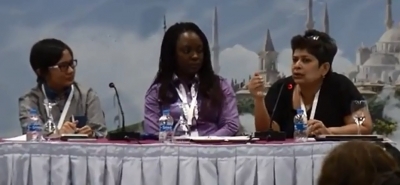 By Sonia Randhawa
By Sonia Randhawa
Annually, the world's largest convention of techies, corporation, governments and policy advocates meet at the Internet Governance Forum to help chart the directions in which the internet will grow. It's one of the world's most open policy-making forums, partly because there is no pressure to make decisions or come out with binding policy resolutions, but it provides an opportunity for CSOs, corporations and governments (allegedly on an equal footing) to listen to each other.
In 2014, 2,400 people came together from 2-5 September in Istanbul. But very few of them are working on issues of gender, women's rights or sexuality. Internet governance, where it doesn't raise titters of concern about how a creature as unwieldy as the internet can be governed, is seen as a matter of codes and technology. And to some extent that's accurate, but these codes and technologies are shaping our lives. Gamergate. The violation of Jessica Lawrence. The videos of teen girls raped in South Africa. The banning of mobile phones for young women in India. Misogyny online has 'real world' impacts that hurt, kill and maim. And the way that technologies are built and governed is being decided in forums such as the IGF.
This makes internet governance and the IGF a matter of concern for all those who want to build an inclusive, equal and feminist future. The absence of human rights and feminist activists from the IGF could leave the playing field, the decision-making, to governments and corporations. Fortunately, however, there are some organisations that are bringing gender issues to the IGF in powerful and strategic ways (see links below).
However, there are still not enough feminist voices at the IGF. While women's representation has been improving each year, many of these women are representing governments or corporations and are not approaching internet governance from a feminist perspective. This does not have to be the case. While recognising that feminist organisations are under-funded and overworked, if you are concerned about issues to do with the impact of digital media on women's safety, health and autonomy, the IGF has a very open process – which has already started for next year's meeting in Brazil. Keep an eye on this website. It is possible to participate remotely, or to participate in local or regional IGFs, held in most regions globally. It would be great to see more feminists attending or taking an interest in what is happening at this forum, to help shape an inclusive feminist future.
For more information, check out these links:
http://www.genderit.org/editorial/why-do-feminist-principles-internet-matter
http://www.giswatch.org/2014-communications-surveillance-digital-age
http://www.intgovforum.org/cms/dynamiccoalitions
Sonia Randhawa is a current Board Member of Isis International.





 The
The 
 Isis Resource Center holds one of the largest feminist collections of materials in the Global South. With 40 years of publication experience, Isis holds a vast collection.
Isis Resource Center holds one of the largest feminist collections of materials in the Global South. With 40 years of publication experience, Isis holds a vast collection.